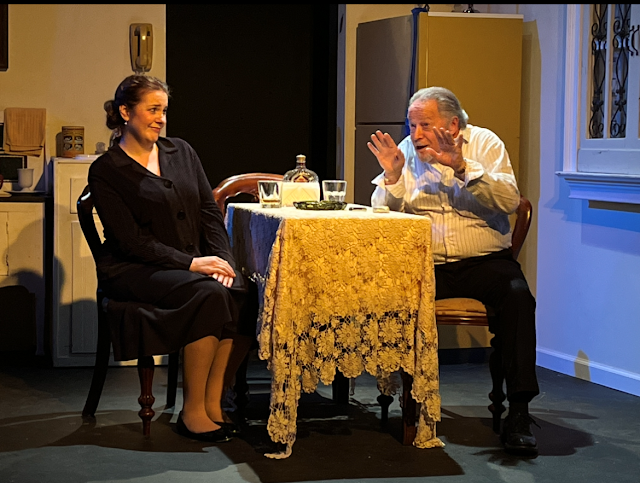A Tomato Can’t Grow in the Bronx
Written by Gary Morgenstein
Directed by Bernice Garfield-Szita
Presented by Tomato Players, LLC at the Chain Theatre
312 W 36th St., 4th fl., Manhattan, NYC
December 2-17, 2022
 |
| Holly O'Brien and Jackie Kusher. Photo by Mateo Del Campo |
The Bronx of the 1970s is popularly associated with images of poverty and burning buildings, and Gary Morgenstein's play A Tomato Can't Grow in the Bronx, winner of three 2022 Perry Awards from the New Jersey Association of Community Theaters (NJACT), focuses on one extended family of Bronxites on the cusp of this tumultuous decade, following them over several days in June of 1968 that represent a potential turning point for all involved. The characters in Tomato must reckon with their pasts as they attempt to chart their futures, and personal and familial change finds echoes in the social changes taking place around them. This ultimately warm, humorous family drama asks how far love involves letting go–of place, of control, of patterns of behavior–in order to better cultivate healthy relationships.
 |
| Andrea Bell Wolff and Spencer Neumann. Photo by Mateo Del Campo |
When the play opens, Sammy Abrams (Mike Roche), his wife Eleanor, or Ellie (Holly O'Brien), and their teenaged son Elliot (Spencer Neumann) have been living in the apartment next door to Ellie's parents, Harry (Jackie Kusher) and Gladys Simms (Andrea Bell Wolff) for 16 years. Sammy, a veteran, struggles financially although he works as a contractor under Harry. Harry is closer to Ellie than his son-in-law, his grandson, or even his wife, despite his parenting having had some unwelcome effects on his daughter when she was younger. Gladys, resentful of this dynamic, has Elliot as her own favorite. Elliot dreams of being a sportscaster and occasionally narrates the action like it is a ball game. But an assault on Elliot, having taken place just prior to the opening scene, brings a different dream to the fore for the Abramses, one that would require Harry's help: moving away from the Bronx to the beckoning suburbs of Long Island.
 |
| Mike Roche and Holly O'Brien. Photo by Mateo Del Campo |
In addition to the interpersonal conflicts rooted in the character's shared histories and relatably human flaws, generational differences–including those regarding attitudes towards race–also create some friction. For example, Elliot, imbued with a boyish earnestness by Neumann in his off-Broadway debut, challenges his elders' use of certain terms and finds it prudent when speaking to his mother to append a Jewish-sounding last name to the Latinx girl with whom he is infatuated. Such frictions also gesture towards the larger demographic shifts in which the family will be participating if the Abramses are indeed able to leave the city and buy their own suburban home, the possibility of an entire backyard held in tantalizing opposition to the symbol of Sammy's sickly fire-escape tomato plant. At the same time, the family's aspiration also makes one think about how increasingly unattainable this version of the suburban (American) dream is, whatever one thinks of it sociologically.
 |
| L to R: Mike Roche, Andrea Bell Wolff, Marina Chan, Holly O'Brien, & Jackie Kusher. Photo by Mateo Del Campo |
The single set in the second act, a model home in Long Island where the family meet hippie real estate agent Madeline Kramer (Marina Chan), who is pursuing her own upward mobility after a stint in clerical work, allows for a faster pace as decisions and revelations come to a head. Throughout, the cast generates a convincingly rough-and-tumble family dynamic, as part of which Wolff's Gladys is often wonderfully acerbic. For Morgenstein's characters, perhaps
A Tomato Can’t Grow in the Bronx, but that failure provides fertile soil for the possibility of something more.
-John R. Ziegler and Leah Richards







Comments
Post a Comment